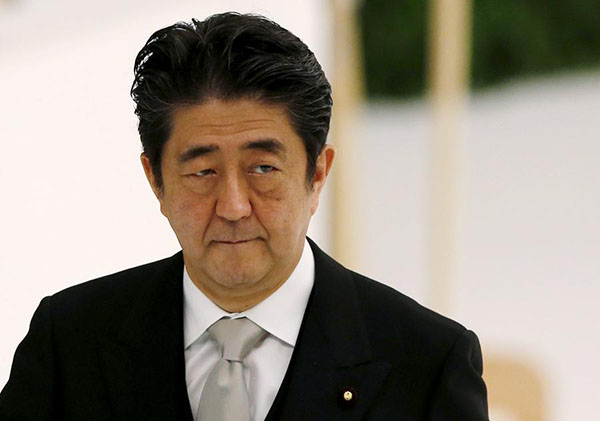Reaction to Ban's visit sets Abe on wrong side of history
Updated: 2015-08-31 08:11
(China Daily)
|
|||||||||||
 |
|
Japan's Prime Minister Shinzo Abe attends a memorial service ceremony marking the 70th anniversary of Japan's surrender in World War Two at Budokan Hall in Tokyo August 15, 2015. [Photo/Agencies] |
The Japanese government's "concern" about UN Secretary-General Ban Ki-moon's visit to Beijing betrays the narrow-mindedness of the Shinzo Abe administration and its obstinacy in clinging to wrong perceptions of history.
After the announcement that the UN chief would attend the upcoming series of events commemorating the end of the World War II in Beijing this week, a Japanese foreign ministry official said Tokyo has asked the world body to "take a neutral position on events that focus mostly on the past" and expressed "strong displeasure" with the UN chief's attendance.
Such an open display of displeasure is against diplomatic etiquette, not to mention that Japan's concerns are ill-grounded as well as unreasonable.
Abe turned down China's invitation to attend the commemorations and let slip a historic opportunity to effect an immediate reconciliation in Northeast Asia over historical issues.
The Japanese government's bashing of Ban over his attendance is based on its desire for others to forget the unpleasant past just as it is trying to get the Japanese public to do. Such self-deceiving self-righteousness will only further isolate Japan from the international community on the issue of history.
Some 30 heads of state and government leaders, including Russian President Vladimir Putin and Republic of Korea President Park Geun-hye, will attend the military parade on Sept 3. The attendees also include government representatives from 19 countries and the heads of 10 international organizations, including UN chief Ban.
Like Ban, these dignitaries see the upcoming commemorations as an important way for us to reflect on the past, look at the lessons we have learned and how we can move ahead to a brighter future based on these lessons.
China has repeatedly said this week's activities are not targeting specific countries, not Japan or its people. But it seems Japan still wrongly believes the parade staged in Beijing will whip up anti-Japanese sentiments.
If there are some anti-Japanese sentiments in the region or elsewhere, they have been triggered by Japan's own unrepentant attitude towards and constant whitewashing of its war atrocities. And Abe has given up one opportunity after another, including his attendance at the Beijing parade, to quell those unfavorable sentiments towards Japan.
It is both unwise and counterproductive for Japan to harbor even an iota of the intention to place itself on the opposite side of countries and international organizations that have agreed to send representatives to Beijing this week.
Related Stories
Abe's avoidance of ceremonies shows he seeks no reconciliation 2015-08-26 07:46
Shinzo Abe won't attend Beijing's WWII event 2015-08-25 11:08
Abe shows he has no desire to mend fences 2015-08-25 08:10
Abe's 'normal country' will not be normal 2015-08-25 07:44
Today's Top News
Hundreds die as desperate migrants head for Europe
Why China will have a 'soft' landing
All creatures great and small help keep V-Day parade safe
Class: Worlds apart, but
learning together
Ministry denies troops sent to reinforce DPRK border
Property investment rules eased
Apple may launch new iPhones at Sept 9 event
Hungary scrambles to confront migrant influx
Hot Topics
Lunar probe , China growth forecasts, Emission rules get tougher, China seen through 'colored lens', International board,
Editor's Picks

|

|

|

|

|

|






